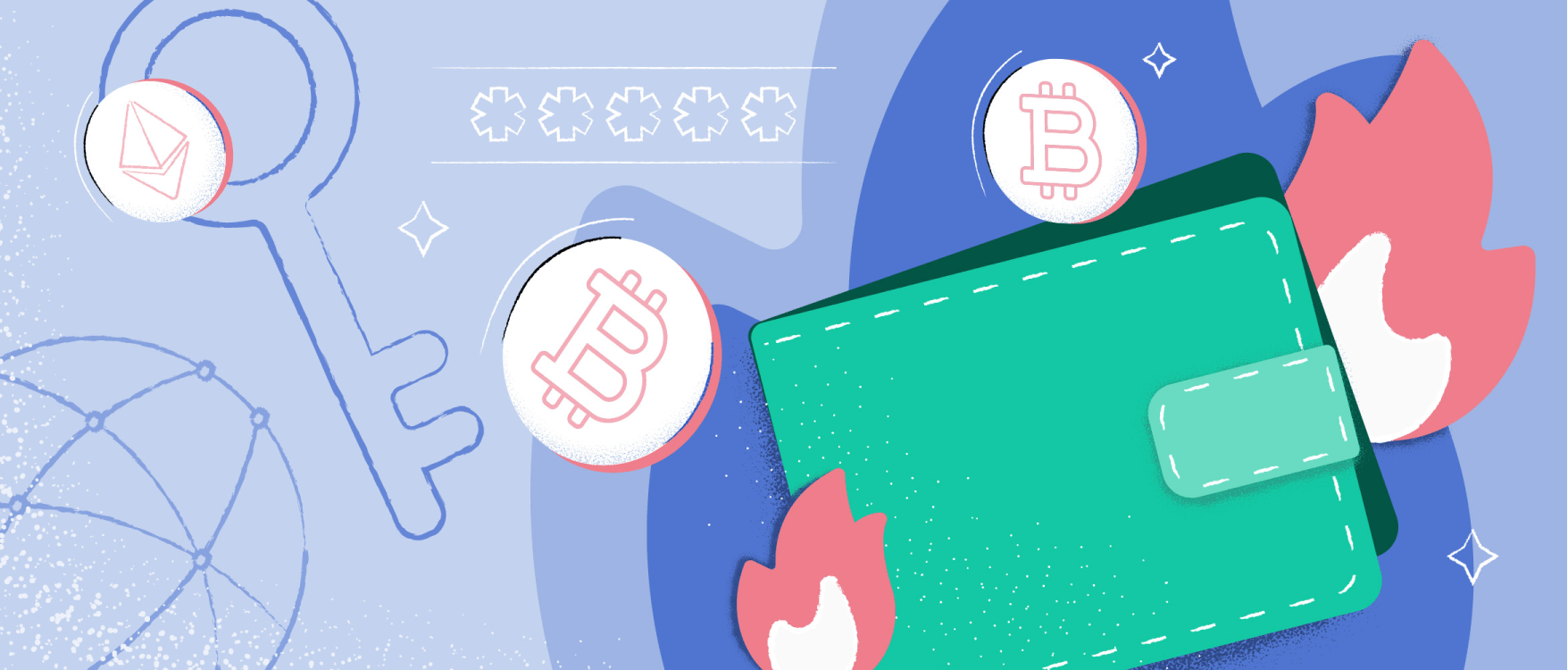
- All
- Tools
- Analytics
- Technical Analysis
- Trading
- Blockchain
- DeFi
- Guides
- Company News
- Educational
- Opinion
- Price Predictions
- Market News
- News
- Trading cases
- Practical guides
- Exchanges
- Trading signals
- Cryptocurrency
- Crypto bots
- Other
Become a crypto master
Learn everything about crypto,
trading and bots

What Is a Hot Wallet? Purposes and Risks Explained
If you’ve just bought your first cryptocurrency, now might be the perfect time to think about where you plan on keeping it safe. Storing it directly in your account on a crypto exchange seems to be the first choice for beginners, but there are better and safer options.
In this article, we’ll explain the basics of hot wallets and how to use them.
Start Trading on 3Commas Today
Get full access to all 3Commas trading tools with free trial period

What is a hot wallet?
Let’s imagine a trader who’s just bought 1 Ethereum (ETH) on a crypto exchange. Having just been purchased, it appears in the internal crypto exchange wallet. If the trader would like to use it for further trading, they could leave it there. However, if they have no plans on trading their ETH anytime soon, they could withdraw it to a hot wallet instead.
A cryptocurrencyhot wallet is any app, platform, or tool that allows users to send and receive cryptocurrency. Hot wallets are constantly connected to the internet and therefore need an internet connection to operate.
How does it work?
Like any other crypto wallet type, hot wallets contain a private and a public key:
- The private key is used to send crypto to another wallet. Just like a PIN code for your bank card, you should never reveal your private key to anyone.
- The public key serves as a way to receive and accept crypto. This is akin to a bank account number that you can share with third-parties.
As we already mentioned, the critical feature of hot wallets is that they are connected to the internet. Although the internet connection makes hot wallets potentially hackable, having an external hot wallet is still a safer option than trusting an exchange to look after your cryptocurrency. It’s important to note that exchange wallets are considered hot wallets themselves, but aren’t the safest of options.
This is because exchanges have access to your cryptocurrency and private keys, making them not only more hackable, but easily censored. For instance, if you store cryptocurrency on your Binance exchange wallet, you won’t be able to access your cryptocurrency if the exchange has an outage. Alternatively, with your own wallet, you maintain complete control over your private key, and can access it at any time.
Let’s go back to the trader from our example. Instead of keeping their Ethereum on their exchange, they could install a hot wallet app on their phone and withdraw their ETH to that wallet. With an app, it’s easy to send or receive cryptocurrency, which makes it a good solution for everyday transactions. (For those that might need more explanation, we made an article on how to actually use a crypto wallet.)
Types of hot wallets
There are three types of hot wallets. Let’s have a look at each of them.
Web wallets
This type of hot wallet allows accessing funds via a web browser interface. There’s no need to install any additional software on your device: all you have to do is to login into your account on a web service, and you’re ready to go.
Trustable web wallets offer safety features like two-factor authentication methods, IP whitelisting, etc. However, web wallets aren’t suitable for long-term asset storage since they most often function within crypto exchanges.
On the other hand, this is a convenient way of interacting with the blockchain for beginners and occasional crypto traders.
Among the most popular web wallets are Trust Wallet from Binance and Guarda.
Pros | Cons |
|---|---|
Easy to use, mostly user-friendly interface. | Web wallet services and web wallets on crypto exchanges don’t give you access to a private key and aren’t transparent. |
You don’t need to install software on your device. | Transactions are always processed through a third party. |
Free to use. | |
Compatible with every device (no attachment to the OS). | |
Allows storing almost any digital asset (altcoins, tokens, Bitcoin). |
Desktop wallets
Desktop wallets are considered to be the safest type of hot wallet. To use a desktop wallet, traders need to install a software program onto their desktop designed to communicate with the blockchain on their computers.
Some desktop wallets use software to connect with the blockchain through an internal interface so as not to download the entire blockchain to a device, which would consume significant memory and storage space. Yet, full-node desktop wallets are more secure because they don’t need third parties to verify transactions on the blockchain and instead verify each and every blockchain transaction themselves.
While web wallets store your private key online (on their servers), desktop wallets store a private key on your computer’s hard drive. This means, a hacker would need to infiltrate your computer directly in order to steal your assets. While this seems optimal, it also means that if your hard drive gets damaged or lost and you didn’t backup your private key information, you will no longer have access to your digital assets.
That leads us to another point: you must always back up your computer. If for some reason it fails, your access to your wallet dies with it. This is what happened to James Howells. In 2013, he accidentally threw away his laptop with a crypto wallet along with 7,500 Bitcoin on his hard drive. Now, he’s still desperately trying to get permission from the local council to search a garbage dump in an attempt to retrieve the misplaced hard drive.
Examples of popular desktop wallets are Mycelium and Bitcoin Wallet by Schildbach.
Pros | Cons |
|---|---|
The safest among hot wallets. | Are only as safe as your computer and the internet service you use. |
Compatible with cold wallets (hardware wallets). | You have to install desktop software. |
Allow you to manage private and public keys and wallet addresses. | A full-node desktop wallet (with the blockchain installed on the device) can take up a lot of disk space. |
Can execute transactions avoiding third parties directly within the blockchain, so it’s safer. |
Mobile wallets
In most cases, mobile wallets are just extensions for desktop wallets or even web wallets. They’re great for traders who are always on the go: if you have an internet connection, you can complete transactions regardless of your location.
Unfortunately, however, our smartphones can be the least secure devices and can be easily compromised.
Examples of popular mobile wallets are Mycelium and Trust Wallet by Binance.
Pros | Cons |
|---|---|
Convenient to use since they operate on your smartphone just like any other app. | The least safe type of hot wallet. |
Instant transactions using a QR code. | Are often lacking in some features. |
Safety, security, and risks of hot wallets
Hot wallets are protected with all essential safety and cryptographic features:
- Secure password
- 2FA (two-factor authentication)
- Anti-phishing code
- IP whitelisting
- PIN code
- Variable keyboard layouts
It’s also important to note how a particular hot wallet handles blockchain transaction management. For example, desktop wallets are more secure than web wallets because they can use advanced backup systems, APK files, and SegWit.
Additional safety can be achieved by using a full-node desktop wallet. Full-node wallets allow you to install the blockchain network information on your device, so all the transactions you make go through the blockchain directly instead of a third-party. This lets you avoid any middlemen (or even scammers and fake wallet apps) when transacting on the blockchain.
Also, it’s better to choose hot wallets whose code is open-source. Open-source means the software is open for anyone to view and verify, leaving no unpleasant surprises like a malicious script that can steal your assets.
Hot wallet safety classifications
Custodial | No source | Not reproducible | Reproducible |
|---|---|---|---|
The hot wallet is provided by a service or a platform (often a crypto exchange) holding the funds of a trader. Every interaction with the blockchain occurs through the provider of the hot wallet. In this case, traders can’t manage their private key information. | A service or a provider doesn’t publish the software code of a hot wallet, so it can’t be checked or verified to avoid scams. | When a hot wallet’s software code is published, but it’s impossible to build the same software using the code. This can mean that the code is not an actual code of a software wallet. | The hot wallet’s software code is published, and it successfully reproduces the same hot wallet program. This means that the hot wallet is open-source, which is considered the safest hot wallet type. |
Why do traders use hot wallets?
There’s always a compromise between convenience and security. Hot wallets are by far the most convenient way to transfer and use cryptocurrencies on the fly. Traders can transact instantly using hot wallets on their smartphones or desktops and withdraw funds from a crypto exchange quickly. Simultaneously, hot wallets are easier to use for beginners who aren’t as versed in cryptocurrencies.
However, hot wallets have some security downsides, and aren’t a go-to choice for long-term asset storage. As a result, many experienced traders prefer cold wallets, which work without an internet connection. If you’d like to dig deeper into a comparison of different wallets, we prepared an extensive guide to crypto wallets.
To sum up
Pros | Cons |
|---|---|
Hot wallets are free and easy to set up. | A hot wallet private key is online, which makes them potentially hackable. |
Hot wallets are convenient. Managing funds takes no time, and if it’s on your mobile, you can manage funds anytime, anywhere. | In the case of hot wallets, security relies heavily on the trader’s awareness of different scams, potential malware, etc. |
Hot wallets support a broad spectrum of digital assets, including tokens, Bitcoin, and altcoins. | Only the biggest hot wallet providers offer technical support. |
In many instances, the speed and ease of use for hot wallets balance out the tradeoff of weaker security. They work seamlessly by quickly transferring assets to another user or engaging with crypto exchanges. Plus, the idea of a wallet not controlled by a third party is compelling. With all the growing attention surrounding DeFi, NFT, and cryptocurrencies in general, hot wallets are likely to become even more popular as the industry grows.
FAQ
A hot wallet is an app or a platform that allows you to store, send, and receive cryptocurrency. Hot wallets require an internet connection to operate.
Several features, such as two-factor authentication, additional passwords, backups, etc., aim to provide hot wallet users with as much security as possible. Still, any wallet connected to the internet is potentially hackable. There’s always a compromise between convenience and safety.
The safest hot wallets are full-node desktop wallets based on open-source code.

A proven leader, successful at establishing operational excellence and building high-performance teams with a sharp focus on value creation and customer success.






